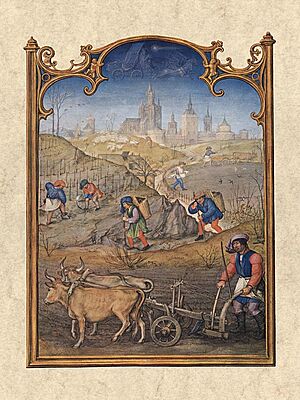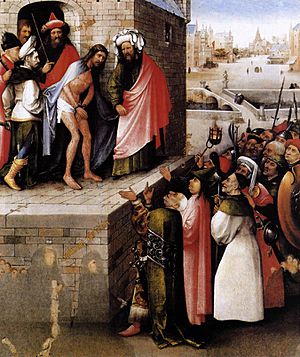Walter Kennedy (poet) facts for kids

Walter Kennedy (born around 1455, died around 1508) was a famous Scottish poet. He was the younger brother of John Kennedy, the second Lord Kennedy of Dunure. He was also a church leader, known as the parson of Douglas.
Walter Kennedy grew up in the Clan Kennedy, a very important family in Dunure, South Ayrshire, Scotland. This area was part of Galloway, where many people spoke Gaelic. It's very likely that Walter Kennedy spoke Gaelic too. He went to the University of Glasgow, where he earned his first degree in 1476 and a master's degree in 1478.
Because he was the great-grandson of King Robert III and the nephew of James Kennedy, a powerful bishop, Walter had strong connections to the royal court. He owned land in both Carrick and Galloway. He also held important church jobs, like being the rector of Douglas and a canon at Glasgow Cathedral.
Walter Kennedy's Poems
Walter Kennedy was a Scottish poet, called a "makar," who lived during the time of King James IV. He is perhaps most famous for his poetic "battle" with another poet, William Dunbar, in a work called The Flyting of Dumbar and Kennedie. However, his other poems show that he was a very skilled writer in many different styles. It's thought that many of his poems have been lost over time.
His most impressive poem that we still have today is The Passioun.
Even though Kennedy's poems are written in Middle Scots, he might have also written in Gaelic. In The Flyting, Dunbar makes fun of Kennedy's roots in Carrick. Dunbar connects Kennedy strongly to "Erschry," which meant the Gaelic bardic (poetic) tradition at that time. Dunbar wrote:
- Sic eloquence as thay in Erschry use,
- In sic is sett thy thraward appetyte.
- Thow hes full littill feill of fair indyte.
- I tak on me, ane pair of Lowthiane hippis
- Sall fairar Inglis mak and mair perfyte
- Than thow can blabbar with thy Carrik lippis.
This means:
- The kind of fancy talk they use in Gaelic areas,
- That's what you like.
- You're not good at writing nice poems.
- I bet a person from Lothian
- Can write better and more perfect English (Scots)
- Than you can babble with your Carrick lips.
Walter Kennedy also appears at the end of Dunbar's poem Lament for the Makaris (around 1505). In this poem, Kennedy is described as being close to death. However, there is no clear proof that he died exactly at that time. Some historians think he might have lived until 1518.
Walter Kennedy's Works

Only six of Walter Kennedy's poems still exist today. These include his part in The Flyting. Together, these poems have a total of 2443 lines. Kennedy's longest poem is The Passioun of Crist. This poem tells the story of Christ from his birth to his ascension into heaven. It's a very important work, quite different from The Flyting.
He also wrote four other shorter poems:
- An aigit man, twys fourty yeiris
- At Matyne hour, in myddis of the nycht
- Ane Ballat of Our Lady
- Leif luve, my luve, na langar it lyk
Walter Kennedy was a well-known poet during his lifetime. Other famous poets like Gavin Douglas and Sir David Lyndsay praised him in their own writings.
Walter Kennedy's Influence
In the 20th century, the poet William Neill was very interested in Walter Kennedy. Neill was curious about Kennedy's roots in South Ayrshire and his possible role as a Gaelic speaker in the Scottish court. Because of this, Neill wrote poems that honored Kennedy.
One example is a Gaelic poem called Chuma Bhaltair Cinneide, which means In Memory of Walter Kennedy. It begins:
Chunnaic mi Bhaltair Cinneide
a' coiseachd troimh clach mo shùl
fo sgàil a' Chaisteal Dhuibh,
aig àm laighe ne greine
is grinneal fo chois
air tràigh liath Dhùn Iubhair...I saw Walter Kennedy
walking through the apple of my eye
under the shadow of the Black Vault,
at the time of sunset,
and the gravel under his feet
on the grey beach of Dunure...
 | Stephanie Wilson |
 | Charles Bolden |
 | Ronald McNair |
 | Frederick D. Gregory |

